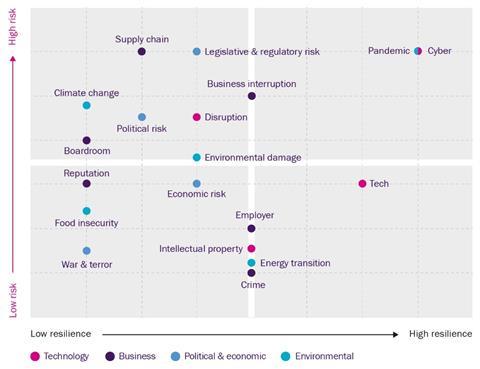Sector attitudes to risk vary, finds Beazley, with those hardest hit by lockdown restrictions feeling less resilient
Beazley has published a report which delves into executives’ sentiments towards four key risk areas: technology, business, environmental and political & economic.
With Covid-19 having become the biggest catalyst of operational and strategic change in a generation, the report also examines how the health crisis has impacted leaders’ sense of resilience and ability to manage risk now and in the future.
Unsurprisingly there are wide disparities in how resilient different sectors feel to risk, with the force of the pandemic likely to be a key influence on current states of mind.
Sectors that feel more resilient compared to 12 months earlier include technology, media & telecoms, financial institutions and, to a lesser extent, healthcare & life sciences.
Sectors feeling less resilient include hospitality & entertainment – perhaps one of the hardest hit by lockdown restrictions – and the public sector including education.
Commenting on the findings, Lou Ann Layton, Beazley’s head of Broker Relations & Marketing, said:
“As insurers, we cannot rely on past perspectives of what our clients want or need.”
“Understanding businesses’ risk appetites, where they feel most vulnerable and where they need our help to build resilience to a disorientating array of risk exposures is critical to our ability to provide the value, expertise and services our clients need.”
Cyber tops list of concerns
Respondents ranked risks according to how significant they are to their business and in turn how resilient they felt to them.
Risks within the high risk-low resilient threat categories include interconnected and more complex areas of risk including supply chain, business interruption, climate change, political, legislation and regulation, disruption and disintermediation, and environmental.
Nine in 10 leaders currently feel their businesses are either moderately (56%) or highly (35%) resilient, while there is a strong sense of optimism for the future with 85% expecting to feel more resilient in 12 months’ time.

Other key findings include:
- 85% of leaders consider the current business environment to be moderate to high risk. However, it is the technology and business-related risks that leaders perceive as easier to manage that worry them most;
- While 37% rank technology as the highest category of risk currently affecting their organisation, this is followed by business (33%), political & economic (18%) and environmental (12%);
- Cyber is the technology risk highest on leaders’ lists of concerns however they also feel relatively well prepared to handle it, with 44% feeling ‘very prepared’ to manage their cyber risk, and
- Like cyber, pandemic is seen as high risk yet respondents also feel well prepared to manage it. This sits within the ‘environmental’ category, which is the lowest ranked risk overall. This does not necessarily mean leaders do not worry about environmental risk but they may consider it less pressing or harder to directly influence than other risk categories.
Bethany Greenwood, head of Cyber & Executive Risk and interim co-chief underwriting officer at Beazley, said: “One of the key learnings from the pandemic is that, by and large, businesses have survived, adapted and thrived.
”Almost half feel more resilient than one year ago and 84% are confident they will be even more resilient in a year’s time.
“This is incredibly positive given the challenges businesses have had to contend with over the last 15 months. However despite the green shoots of economic recovery we are all aware we are not out the woods with this virus.
”As lockdowns end and government stimulus packages are withdrawn, organisations will need a clear view of their evolving risk exposures.
”The insurance industry’s role in supporting clients to proactively manage their less predictable and harder to quantify risks is even more important to help build overall resilience.”




















No comments yet